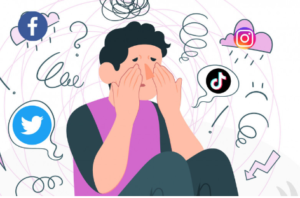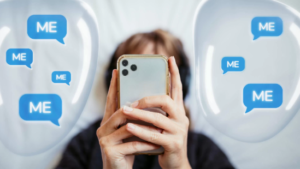Social Media’s Affect on Mental Health
Social media has transformed our contacts and communication style. Although it has many advantages, its effects on mental health have grown to be a major focus of study and worry. Examining several studies, professional perspectives and personal experiences, this paper investigates the good as well as bad impacts of social media on mental health.
Appreciating Social Media’s terrain
A Synopsis of History
Early in the 2000s, social media started to pick momentum on sites like Friendster and MySpace. It has developed over years into a large digital terrain with heavyweights like Facebook, Instagram, Twitter, and TikHub. These days, billions of individuals utilize these sites, which shapes our interactions with others, expression of ideas, and sharing of experiences.
The attraction of connectivity
Social media appeals mostly because it allows people all around to be connected. It lets users access a lot of information, keep relationships, and distribute live updates. But the way these relationships develop and are maintained might have significant effects on mental health.
Helpful aspects of social media for mental wellness
1. Support and community building
The capacity of social media to build community is among its most important advantages. Online tools can be a lifeline for those dealing with mental health issues.
Many internet support groups offer a safe environment where people may connect with others who know their experiences, share their challenges, and find encouragement.
Awareness campaigns on mental health concerns now find great strength on social media. Open conversations and lessening of stigma have come from campaigns like
#BellLetsTalk and
#MentalHealthAwareness Month.
2. Information’s Access
Information is shared mostly on social media. Expert advice, instructional materials and mental health resources are only within users’ reach.
Using blogs, podcasts and videos on social media, many mental health experts publish insightful analysis, coping mechanisms and self-care advice.
Crisis Resources: Searching for resources posted on social media allows people to get quick assistance during crises, therefore perhaps saving lives.
3. Expression of Creativity
By letting users express themselves artistically, sites like Instagram and TikHub inspire innovation.
Sharing poetry, music or artwork can be healing. Making work that captures their feelings helps many people heal.
Positive Feedback Loops: Getting compliments from peers helps one feel more confident and like they belong.
Negative Social Media Effects on Mental Health : Comparison Culture
Social media’s advantages can frequently foster a culture of comparison.

Users of unrealistic standards often feel inadequate and have poor self-esteem by comparing their life to the well chosen highlights of others.
1. Constant exposure to others’ apparently flawless lives can lead to FOMO, or fear of missing out, which causes anxiety and melancholy since people feel they are deprived of experiences.
2. Harassment and cyberbullying
Social media’s anonymity might empower bad behavior.
Many people especially teenagers are victims of cyberbullying, which can cause extreme emotional suffering and long-term mental health problems.
Trolling actions usually target weaker people, aggravating emotions of loneliness and hopelessness.
3. Addiction and Distraction
Addiction to social media can cause overuse of screens and diversion from other activities.
Dopamine Loop: Likes shares and comments provide quick gratification that can lead to a loop of dependency that affects focus and output.
Excessive use, especially before bed might throw off sleep patterns, therefore aggravating mental health problems.
Social Media’s Place in Mental Health Treatment
1. Online Counseling and Teletherapy
The emergence of social media has helped teletherapy to flourish, hence increasing the availability of mental health care.
Those who might ordinarily avoid therapy because of stigma or logistical difficulties might interact with therapists online.
Many sites provide reasonably priced mental health treatments, therefore democratizing access to care.
2. Mental Health Tools and Apps
Many apps encourage mental health by means of social media techniques to include users.
Applications let users monitor their moods, therefore offering insights and guiding identification of triggers.
Many apps have social elements so users may join groups centered on mindfulness and self-improvement.
Curate Your Feed One great way to minimize the bad effects of social media is to create your feed.
Choose to follow accounts that inspire, teach, and encourage positivity positive influencers.
If some accounts cause bad feelings, think about muting or unfollowing them to help to build a better online environment.
2. Establish Limiters
Mental health depends on setting limits about social media usage.
Set aside particular periods for using social media to help prevent too much scrolling and distraction.
Periodically cutting off from social media can help you clear your mental state and lower stress, thereby helping to reset you.
3. Participate Mindfully
Mindful approach of social media will improve your experience.
Before interacting with material, consider whether it brings worth or positivity into your life.
Engage authentically: Give genuine connections top priority instead than flimsy activities. Real connections help one to feel supported and like one belongs.
1.Social Media’s Future and Mental Health: Changing Platforms
The way social media develops will affect mental health as well.
Future systems could include capabilities to prevent bad encounters or reminders for self-care, therefore promoting mental well-being.
Emphasize community building since a growing tendency is toward real connections instead than flimsy interactions.
2. Unceasing Research
Constant study will enable us to grasp the complexity of how social media affects mental health.
Future research will offer understanding of the long-term consequences of social media use on mental health.
Research will pay more and more attention to different demographics to guarantee that conclusions apply to other demographic groupings.
Finish
Social media has a complex effect on mental health that offers both possibilities and problems. It has hazards that might compromise well being even while it has the ability to strengthen relationships and offer help. Understanding these dynamics and using conscious use techniques can help people to maximize the benefits of social media while reducing its negative consequences. Promoting mental health in an ever linked world will depend on a balanced approach as we negotiate this digital age.
